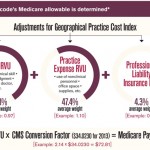The ACR would like to have the opportunity to bring more codes through the process in the future. These AMA committees are part of the structures that work for physician reimbursement. In order to improve reimbursement, the ACR must have a seat at the table. The only way to have a seat is the AMA House of Delegates.
Tackling the fee schedule: Physician reimbursement through Medicare depends on the Medicare physician fee schedule. Every year, CMS releases the proposed physician fee schedule and allows physician groups from across the United States to comment on the proposed rule before the final rule is announced in November. The AMA gives specialties an opportunity to present information to the AMA to be included in the AMA comment letter. Additionally, the AMA worked tirelessly for several years to prevent drastic cuts in the conversion factor to the physician fee schedule. This year alone the AMA, along with the help of specialties like the ACR, was able to stop a projected 5% reduction to physicians in Medicare payments.
Protecting physicians from medical liability: Several states are in a medical liability crisis and have been in crisis for several years. Rheumatologists have seen drastic increases in medical liability premiums. The ACR, along with the AMA and other specialties, has been working with states and encouraging federal tort reform legislation. At the federal level, the AMA is working to obtain a $250,000 cap on non-economic damages in medical liability cases. At the state level, the AMA is providing resources to assist states in tort reform. Medical liability is a problem that affects all physicians regardless of specialty. The ACR needs the strength of the AMA to fight medical liability.
Every five years, the ACR must verify that 1,000 of its members also belong to the AMA…this year we are short by 300 members.
Battling insurance companies: The AMA’s Private Sector Advocacy division (PSA) works on issues that affect clinicians. In the past the PSA has worked on issues such as prompt-pay laws, Medicare Advantage, claims processing, and antitrust reform. The PSA also monitors the multi-district litigation settlement information. Essentially, the AMA reviews all of the litigation with major insurance companies and assists state societies and specialties in interpreting the settlements. The settlements include Aetna, Cigna, Health Net, Humana, and Wellpoint/Anthem. Additionally, the PSA provides resources to help resolve the issues affecting physicians.
Quality and the physician consortium: The AMA Physician Consortium for Performance Improvement develops quality metrics based on evidence-based clinical performance measures for patient safety. Membership in the Consortium is open to members of the AMA House of Delegates. Measures of interest to rheumatologists include osteoporosis and osteoarthritis. The ACR is currently discussing working with the AMA Consortium on rheumatoid arthritis measures.


